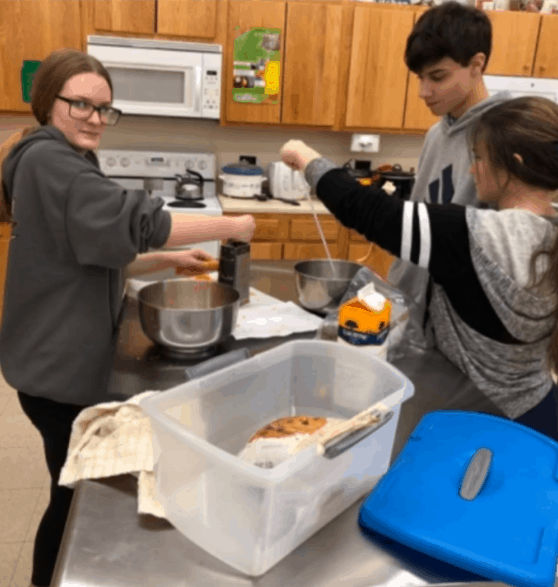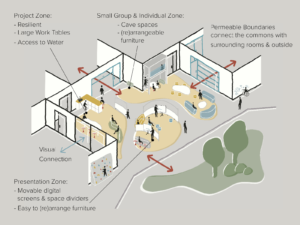Creating Connections Across Slate Valley for the Common Good

By: Casey O’Meara
Like many districts, Slate Valley is unable to transport every student to other locations in the region. So how can Slate Valley create experiences allowing students to recognize what we do have, even when we might not have everything, in order to better understand others in our world? How can a school district in southwestern Vermont consider otherness, social capital, and labels through its communities?
How can students who have experienced trauma, and may have difficulty with past experiences, have new ones created for them in order to heal and make the world a better place through their work?
How can we endear ourselves to our communities, even if our personal views and values might be a bit different, based on points of commonality?
Can Slate Valley develop Service-Learning and Place, Problem, or Project-Based activities to better connect our community with our schools to support each other’s wellbeing?
The inability for all students to experience the content of a course in ways that are real to them presents one of the greatest challenges for educators. Experiential learning in communities necessitates that as students are drawn into the real-world they are using skills in it. The mastery of skills and abilities are present in the work of the community as the focus for learning.
Slate Valley is working to become a collaborative center for experiential learning. Slate Valley’s Center for Experiential Learning (CEL) will support internships, service-learning, entrepreneurship opportunities, field research, capstone projects, cooperative experiences, and job shadows with “anchor institutions” in our communities. Pilot projects will take shape during the 2020-2021 school year with The Binding Site in Benson and Castleton’s Hubbardton Forge.
Slate Valley engages its students in their communities, through experiential learning as deeper learning. S.L.A.T.E (Student Learning Achieved Through Engagement) is the acronym used to represent Slate Valley’s vision. Fair Haven Union High School (FHUHS) is preparing to facilitate S.L.A.T.E through a Valley Commons Project, creating connections across Slate Valley between school and community for the common good.
A Valley Commons Project results in content and skill development during collaborative learning experiences developed between community partners, teachers, students, and parents. The goals of a Valley Commons Project are to enable students to connect their Personalized Learning Plans (PLPs) through community-based applications; to make interdisciplinary connections through Transferable Skills and content proficiencies (science, math, social sciences, English, arts, health, and physical education), and to reflect on and refine an understanding of themselves as learners and as members of their greater community.
FHUHS students will have experiences in the community that are mutually beneficial to community partners and them, through establishing reciprocal partnerships, while providing opportunities to engage in “real-world” work. Vermont’s Act 77 allows Slate Valley Unified Union School District (SVUUSD) to recognize academic and non-academic content and skills necessary for FHUHS graduates by providing guideposts along a purposefully designed path for educators “to foster a system of public education in which every student graduates and every graduate is college and career ready” In Slate Valley we are exploring student-centered learning through an innovative design process to consider equity, access, and opportunity where moments for personal understanding are discovered.

PLPs provide the structure in support of Slate Valley’s mission: to guide each student to meet or exceed standards and develop skills for college and career readiness through our vision to engage learners in rigorous, authentic, experiential, individualized learning. Slate Valley’s PLPs differ by age and ability, K-12, but are created and reflected upon to consider what matters most to each learner as they move through their education.
A Valley Commons Project becomes a graduation requirement for FHUHS’s class of 2021. FHUHS Students, faculty, and community organizations engaged in community service during the 2018-2019 school year in preparation for upcoming Valley Commons Projects. The 2019-2020 school year has faculty involved in community service connected to student’s Personalized Learning Plans and Transferable Skills through community application.
The 2018-2019 FHUHS’ Community Service Projects provided opportunities for students to identify interests, application of knowledge in new settings, and deep reflection as learners. Dakota Bellanger recognized through community service who he is as a learner stating in a Rutland Herald article by reporter Kate Barcellos, “I enjoy building things and making things.” The ability to understand who one is as a learner can be reflected upon through Experiential Learning in Slate Valley’s Valley Commons Projects. Bellanger reflected further, “We’re doing this for a good cause. It’s for others who need the help.” Experiential learning projects off-campus, in combination with reflection, personally and with classmates, reinforces and clarifies the reality of problems rooted in the realities of our world.
Slate Valley educators are designing learning recognizing the need to offer students a chance to be in control of learning, on their terms. Experiences where students express their social abilities and emotional competencies, in addition to their values, beliefs, traditions, and practices, develops one’s emotional abilities. Slate Valley educators are using cognitive science to better motivate, engage, and assess students’ best attempts at academic and behavioral tasks to truly inform their practice.
Motivation, intention, and emotion are individualized and for those who have experienced any amount of trauma, it is imperative that students are able to avoid “re-traumatization” through a combination of “in and out of” classroom learning requiring deep reflection on the transfer of “school” to the “real world.”
The Slate Valley faculty engage with experiential teaching and facilitation methods to better support deeper learning. The design for community-focused experiential learning allows for moments of uncertainty on behalf of teachers and students. This allows students and teachers to develop empathy, flexibility, and imagine and create as true collaborators. As a result, the design of community focused experiential learning requires teachers and students to establish methods of practice where learning is authentic, experiential, and individualized. This form of community-focused pedagogy is only possible with considerable collaboration between “anchor institutions,” schools, and district educators. The transfer of learning must be seen by students as they experience learning in school and in their communities in order to connect school to future aspirations and the development of a high emotional IQ.
For more, see:
- Why Schools Need Signature Learning Experiences
- Kansas City High Schools Add Real-World Learning
- J-term at Lyndon Institute: Engaging in Interest- and Passion-driven Learning
Casey O’Meara is the Director of Curriculum, Instruction and Assessment for Slate Valley Unified Union School District in Southwestern, Vermont where he works to individualize learning through students’ and teachers’ interests and abilities, to serve their needs and help them grow.
Stay in-the-know with innovations in learning by signing up for the weekly Smart Update.





0 Comments
Leave a Comment
Your email address will not be published. All fields are required.